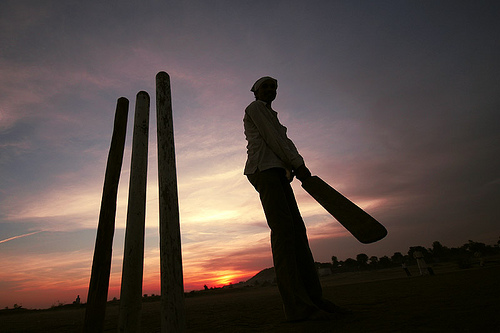
Photo by, and licensed (C BY-NC-SA 2.0) from, kkseema.
At Wordnik, we love all the words (that’s what the heart in the logo means, after all) but there are some words that are especial favorites (that’s what the favorite function is for, after all) … and quite a few of those words are cricketing terms. Only a couple of Wordniks can honestly claim to be true cricket fans (Krishna and Kumanan) but none of us can resist the lure of words like googly (“A googly is a ball delivered by a bowler that looks as if it ought to break from left to right across the bat of a right-handed batsman.”) and Dilscoop (” … [the] stroke “Dilscoop” [ invented by Tilakaratne Dilshan] which involves going down on one knee and scooping the ball over his head in area behind the wicketkeeper.”) Not to mention the best phrase in all of sports: silly mid-off. (Which is the same as the silly mid-on, just on the other side of the pitch. Make sense? No? Well, it doesn’t matter.)
Cricket words are so compelling, in fact, that Wordnik has three different lists devoted to cricket! They are: Sportie: Cricket, i don’t like cricket — i love it, and Cricket! That last link is to an open list — feel free to add your own favorite cricket terms to it!
Is there some other topic that you think has better words than cricket? You can always sign in to Wordnik and create your own list of great words to share …
Fielding in slips or in the gully (on the utterly flat playing surface) is a bit less dangerous than being put at silly mid. Or, depending on your fielding skills, you could be placed at backward square leg, short cover, silly point, fine third man, deep forward midwicket, short leg… If you’re fielding at leg gully, be careful not to collide with the square leg umpire.
Cricket commentary on public radio is a joy for anyone who loves language. (Bill Bryson captures the feeling well in his book “Down Under” aka “Sunburnt Country”.) It’s especially fun when an overseas commentator arrives with a touring team and joins the local broadcasting team — although cricketing nations generally speak English, what a wild variety of dialects we all use!